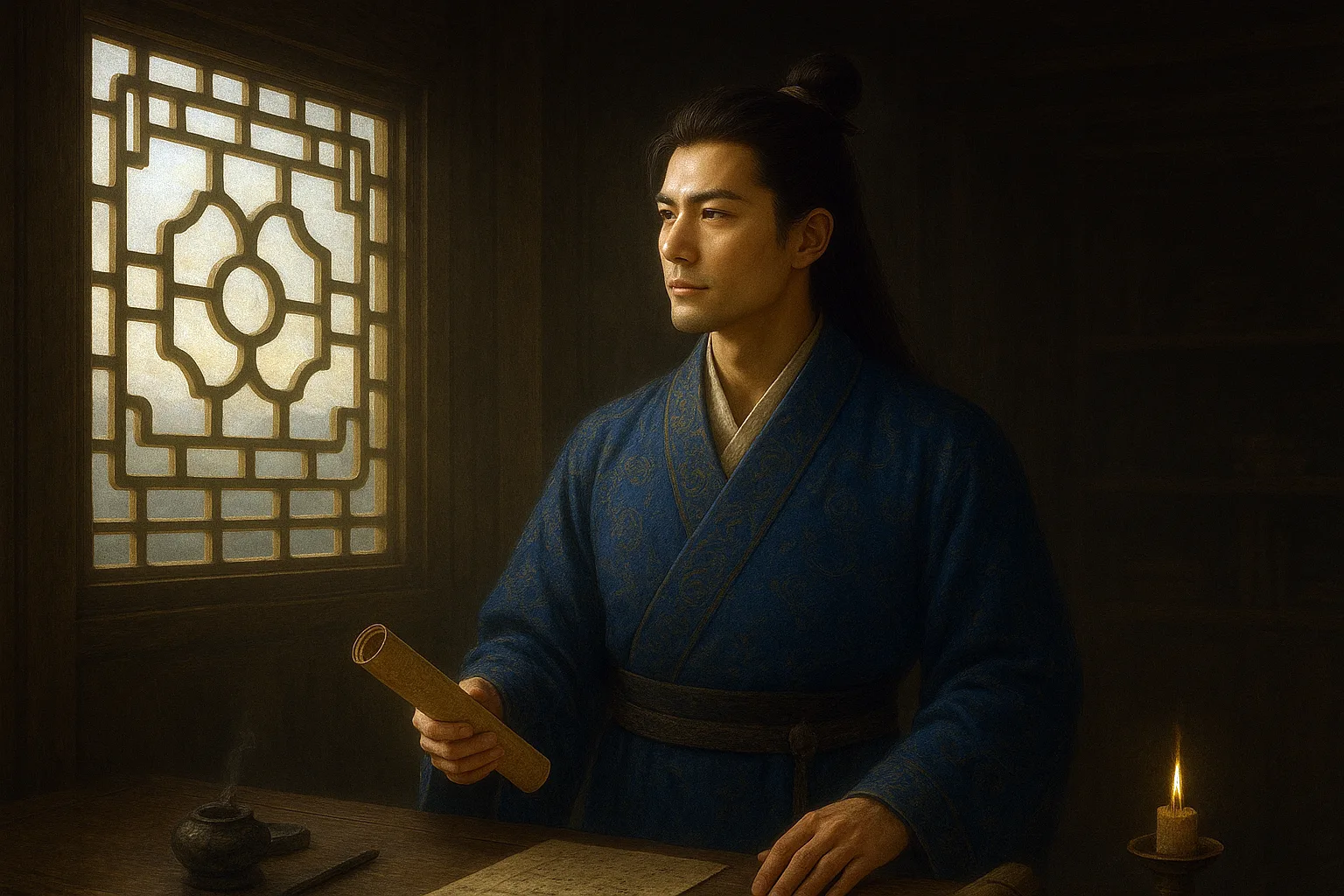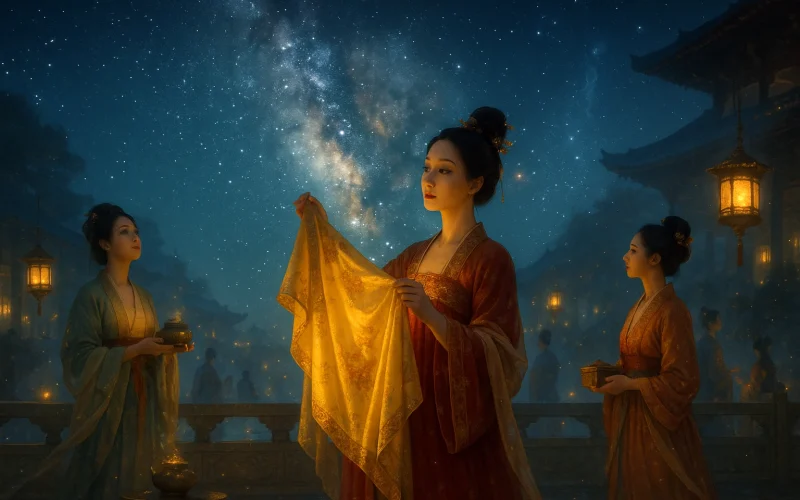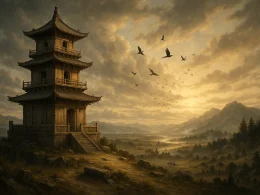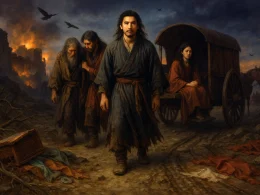The moon is born above the Eastern Sea
And dimly bright throws half her light on me.
At dusk she shines on districts near the border;
At midnight she’s besieged with walls of order.
Her halo sheds a cold light far and wide;
Her beam is blended with frost falling light.
The general hears the horn at break of day;
His war horse yearning for southward way.
Original Poem
「关山月」
沈佺期
汉月生辽海,朣胧出半晖。
合昏玄菟郡,中夜白登围。
晕落关山迥,光含霜霰微。
将军听晓角,战马欲南归。
Interpretation
This poem was composed during the Wu Zhou period, a time of frequent border conflicts. Shen Quanqi, serving in the court, repeatedly heard reports of incessant northern campaigns. The title "Moon Over the Mountain Pass" follows the old Yuefu tradition, often used by poets to express the sorrow of separation between soldiers and their families or to reflect on the realities of war. While inheriting this tradition, Shen Quanqi skillfully employs the "moon" as the unifying image—shining both on the frontier and the heartland, both cold and distant, yet implicitly evoking human sorrow. Without directly depicting grief, the poet uses the "moon's journey" as a thread, creating movement within stillness, allowing readers to feel a profound solitude and the desolate cold of war beneath its clear light.
First Couplet: "汉月生辽海,朣胧出半晖。"
Hàn yuè shēng Liáo hǎi, tóng lóng chū bàn huī.
The Han moon rises over the Liaodong Sea,
Its hazy glow emerging with half-lit radiance.
"Han moon" signifies the moon of the heartland, symbolizing civilization and the homeland, while also alluding to the historical context of campaigns in Liaodong. "Hazy glow emerging with half-lit radiance" gently describes the moon's ascent, blending tranquility with distance and coldness with sorrow. The verb "rises" captures the dynamic movement of the moon ascending in the east, setting the stage for the nocturnal battles on the frontier that follow.
Second Couplet: "合昏玄菟郡,中夜白登围。"
Hé hūn Xuāntù jùn, zhōng yè Báidēng wéi.
At dusk, it shines on Xuantu Commandery;
By midnight, it illuminates the siege of Baideng.
"Xuantu" and "Baideng" are ancient names of northern frontier battlefields. The moon's light moves from the Liaodong Sea, illuminating one place after another, symbolizing the endless prolongation of war. Without depicting weapons directly, the poet uses place names and times ("dusk," "midnight") to imply continuous conflict. This couplet merges the moon's journey with human suffering, rendered with subtle depth.
Third Couplet: "晕落关山迥,光含霜霰微。"
Yùn luò guān shān jiǒng, guāng hán shuāng sǎn wēi.
The halo fades, the mountain pass stretches far;
Its light holds a faint hint of frost and sleet.
This couplet uses scenery to convey emotion, describing the moon's growing coldness. "Halo fades" suggests the deepening night and increasing chill; "hint of frost and sleet" combines visual and tactile imagery, creating a silent and desolate atmosphere. The poet does not mention battle but allows readers to feel the frontier's cold and the soldiers' hardship through the icy moonlight.
Fourth Couplet: "将军听晓角,战马欲南归。"
Jiāngjūn tīng xiǎo jiǎo, zhànmǎ yù nán guī.
The general hears the dawn horn's call;
His warhorse longs to return south.
The conclusion shifts from the moon to people, from stillness to movement. The "dawn horn" breaks the long frontier night—it is both a military signal and a symbol of unceasing war. "Warhorse longs to return south" is particularly moving: personifying the horse to express homesickness, it projects human longing onto the animal, embedding both the pain of duty and the sorrow of separation.
Holistic Appreciation
The poem is unified by the moon's trajectory, from "rising over the Liaodong Sea" to "shining on Xuantu" and "fading over the mountain pass," creating a continuous flow of time and space. Without directly depicting battle scenes, the cold moonlight reflects the frontier's severity and the soldiers' isolation, crafting an意境 of "movement within stillness, depth in distance."
The poet cleverly makes the "moon" a medium connecting homeland and frontier—it is both the heartland's moon and the frontier's moon; it witnesses both war and longing. With a calm tone, Shen Quanqi expresses deep compassion, reflecting the early Tang poets' transition from courtly elegance to genuine emotion and profound imagery.
Artistic Merits
- Unity Through the Moon, Scene-Emotion Fusion: The moon's journey structures the poem, making scenery a vehicle for emotion.
- Subtle Condensation, Movement in Stillness: Avoiding graphic depictions of war, it uses the moon's cold light to imply action through stillness.
- Deep Symbolism: The moon symbolizes homeland, native place, and eternal longing, carrying cross-regional emotional power.
- Strict Meter, Harmonious Rhythm: Precise parallelism and fluid tones showcase Shen Quanqi's artistry as a pioneer of regulated verse.
- Profound Yet Restrained Emotion: Moving from scene to emotion, embedding sorrow in beauty—a classic Tang style "cold to the bone."
Insights
This work uses a single moon to illuminate a thousand miles of mountain passes, refracting the desolation of war and the human heart's yearning for home. It teaches us that true grief comes not from clamorous cries but from silent clarity. Shen Quanqi uses the cold moon to convey the pain of fervent passion; with serene imagery, he expresses the sorrow of separation. The line "warhorse longs to return south" is not just the soldier's voice but also symbolizes humanity's eternal desire for peace and belonging. Though the moonlight is cold, it reveals warmth and hope—this is the most moving humanistic glow in Shen Quanqi's poetry.
About the Poet

Shen Quanqi (沈佺期 c. 656–715), courtesy name Yunqing, was a native of Neihuang in Henan Province and an important poet of the early Tang Dynasty. Along with Song Zhiwen, he was renowned as one of the "Shen-Song" duo, whose work played a decisive role in finalizing the form of the five-character regulated verse (wuyan lüshi) in Tang poetry. His poems often include courtly compositions and travel-themed reflections, characterized by refined elegance and structural rigor. Shen was particularly skilled in the seven-character regulated verse (qilü), and his writing marks a transition from the lingering style of the Six Dynasties to the flourishing era of High Tang poetry. His contributions hold milestone significance in the development of modern-style verse (jintishi).












